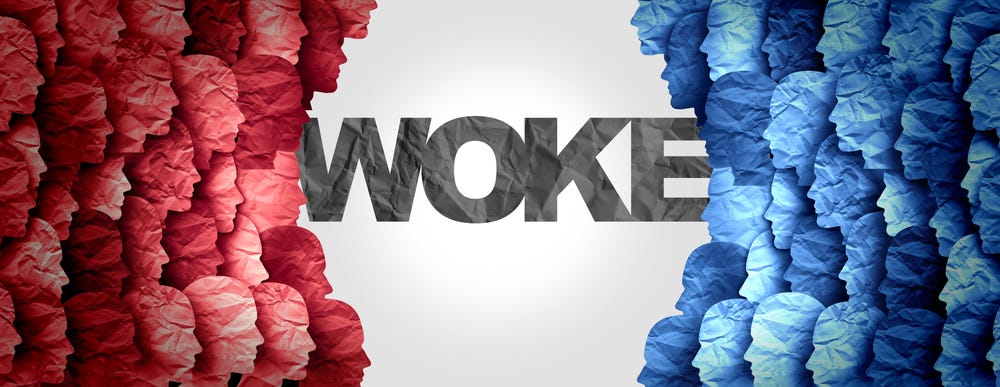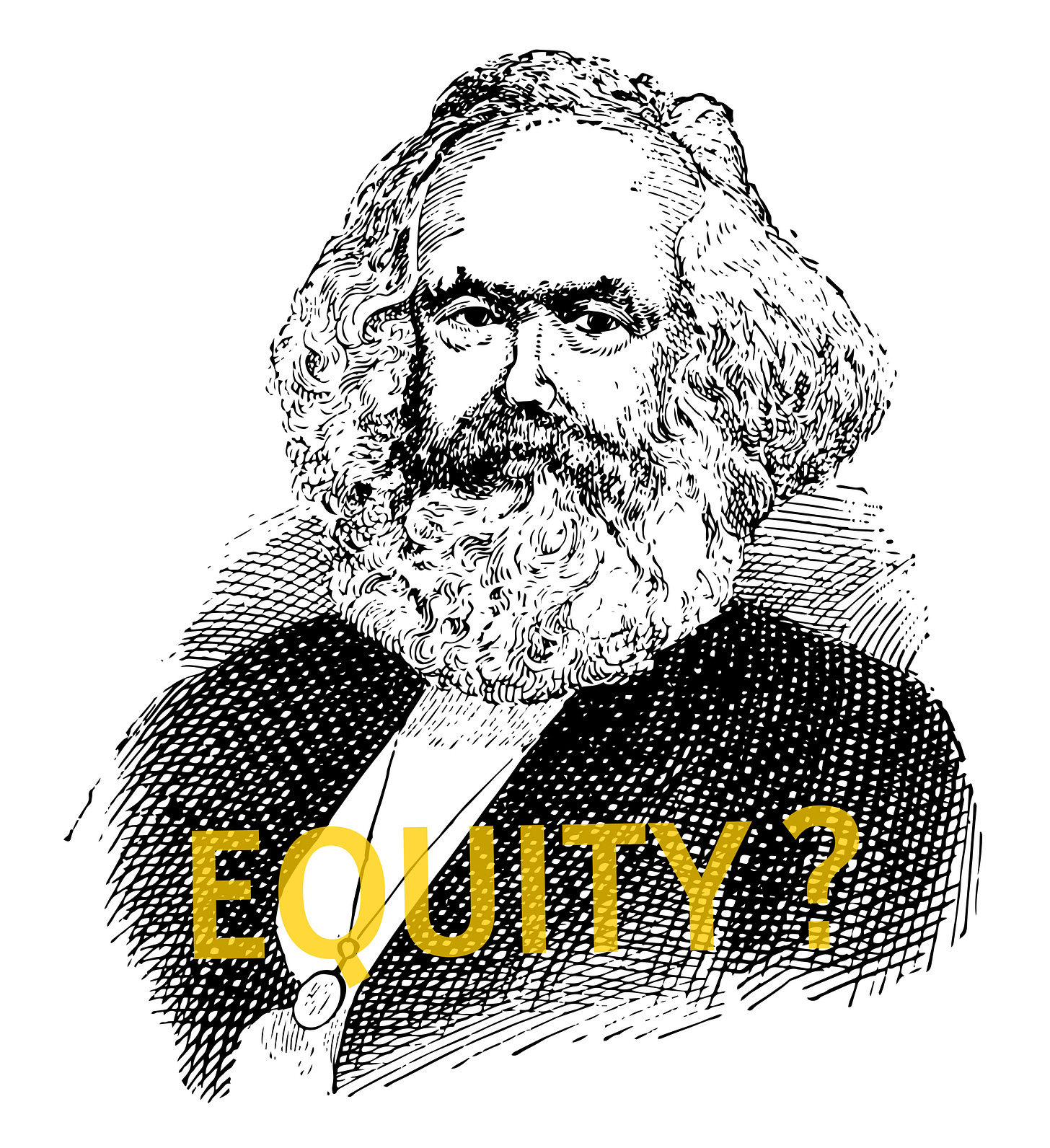E-Pluribus | February 14, 2023
Spoiling for an ideological DEI fight in Florida; why "equity" gets low Marx (pun intended); and lessons from an attempted cancellation.
A round-up of the latest and best writing and musings on the rise of illiberalism in the public discourse:
Graeme Wood: DEI Is an Ideological Test
The Atlantic’s Graeme Wood is by no stretch of the imagination a Christopher Rufo fan (Wood expresses a desire to shower after reading Rufo’s work like after a trip to the beach) but is willing to give Rufo his due nonetheless. While Wood says Rufo is in for a rough fight in Florida against the campus DEI regime, he acknowledges that Rufo is simply turning the ideological tables on his foes.
Critics have accused Rufo of trying “to turn [New College] into a space of extremist indoctrination”—as if a campus with a de facto ideological test for employment is not already political. Whether that ideological test is valid is unsettled in the general public, at least judging by the controversy Rufo has kicked up so far.
It is a simple step, to go from believing that politics is everywhere to believing that because it is everywhere, the politics may as well be one’s own politics rather than one’s enemy’s—to make politics not just omnipresent but hyper-partisan. Curiously, though, those who have spent decades saying that politics is everywhere seemed to have been caught flat-footed when it arrived in the form of Rufo. Last week, when Rufo and another trustee, Jason “Eddie” Speir, showed up to talk to New College’s faculty about their plans, the provost tried to cancel the event for security reasons. . . [Rufo] used the occasion to humiliate the provost, calling her an example of the censorious crybabies whom he had come to relieve of their responsibility.
If you want politics, this is it. It’s playing dirty pool. It’s grandstanding and humiliation. It is a quest for dominance first, and truth if and when we get around to it. Rufo has argued that universities’ embrace of DEI follows what the activist and sociologist Rudi Dutschke called the “long march through the institutions.” Rather than smash governments and universities apart, Dutschke suggested, revolutionaries should burrow deep inside them, master their workings, and effect change like deep-cover Cold War moles. . .
[Floridians voted] for DeSantis for some reason, and, by extension, for his apostle Rufo. Politics, man. And winning elections has consequences. The consequences need not be fatal for the anti-racist left. Advocates of DEI could welcome the chance to defend it in public against a fierce opponent whose power depends on an elected official. Floridians, I assume, do not want to see their universities wrecked or made hostile to minorities. If DEI is a serious defense against that happening, then Rufo’s opponents should demonstrate that a disaster is indeed at hand. . .
Read the whole thing.
Wai Wah Chin: The Equity Delusion and Its Marxist Roots
Playing the Communist Card is fraught, but Wai Wah Chin writes for Real Clear Education that there’s no denying the Marxist roots of the E in DEI. Marx was all about equal outcomes, and Chin argues such a position is antithetical to human dignity, achievement and flourishing.
Equity has many variants, but essentially, equity aims for equality of outcomes, ruling in favor of groups based on overlapping, or “intersectional” oppressions – in diametric opposition to our treasured principle of equality, which aims for equality of rights for individuals.
This just rehashes communism’s slogan, “from each according to his abilities, to each according to his needs,” which dates back to before Karl Marx. Equity, in this context, demands that we confiscate and redistribute, all while employing discrimination to achieve its ends.
In pushing for equal outcomes, equity is deeply delusional. The first delusion is that 100% can be the top 1%. The object of contention – whether it’s getting into Harvard, the Chicago Symphony, the Mayo Clinic, or the NBA – is limited in availability. Excellence is, by definition, scarce.
Also, the inconvenient fact is that, once at Harvard, the Chicago Symphony, the Mayo Clinic, or the NBA, one must perform. The best processes for granting these scarce spots evolved to select for performance. Orchestras have blind auditions, colleges have blind-graded SATs. We can discuss fine-tuning these processes to improve equal rights. Equity, though, wants to be performance-blind. That’s delusional.
The realities of scarcity and performance compel equity to deliver the lowest common denominator; that’s the only way to deliver equal outcomes. It is no accident that standards are lowered when equity trumps merit. Once again, equity’s happy promise is a delusion; equity makes us worse off.
Read it all here.
Philip Carl Salzman: What I Learned When Students Tried to Cancel Me
In 2020, McGill University professor emeritus Philip Salzman came under fire for statements he made regarding the Middle East. Despite the protests, Salzman retained his emeritus status and writes about what he learned from his experience, the experiences of others like him and the mentality that drives such movements. Salzman’s essay appears at Minding the Campus.
In November 2020, eight official student groups published a public letter demanding that the McGill Administration rescind my Emeritus status. This was allegedly necessary in order to honor “the right of Muslims and People of Colour have to feel safe. [sic]”
[ . . . ]
They took particular exception to a statement in my detailed article about conflict in tribal societies and pre-industrial states in the Middle East: I assert that “the Middle East is a place where doing harm and being cruel to others is regarded as a virtue and a duty.” (This assertion is of course supported by abundant evidence. An obvious recent example is the Islamic State.) The students also cited other articles, in some cases distorting the messages. Overall, they claimed that my publications are examples of “racist and Islamophobic dialogues,” although the article on the Middle East mentions neither race nor Islam.
What I found illuminating about the students’ accusations is that they focus on student feelings, of “feeling unsafe,” and being offended by alleged insults to their race and religion. Most interesting is the complete absence of any challenge to my assertions on a factual basis. They never say that my assertions are false. They never bring contrary facts to light nor offer contrary arguments. In other words, the students offer no academic challenge to my work. Their letter is like a placard with a slogan at a rowdy demonstration. The students have no interest in truth or the academic processes aimed at exploring and discovering the truth.
[ . . . ]
Safety and well-being, according to the students, requires the exclusion of opinions with which they disagree. They thus further “demand an immediate, transparent, and student-centred overhaul of McGill’s Statement of Academic Freedom, enshrining the University’s commitment to inclusivity in teaching and research in policy [emphasis added].”
Read it all.
Around Twitter
An interesting (and somewhat lengthy) back and forth between Christopher Rufo and some of his critics:
And finally, when it comes to “wokeness”, Wesley Yang says there’s really no need for confusion:









